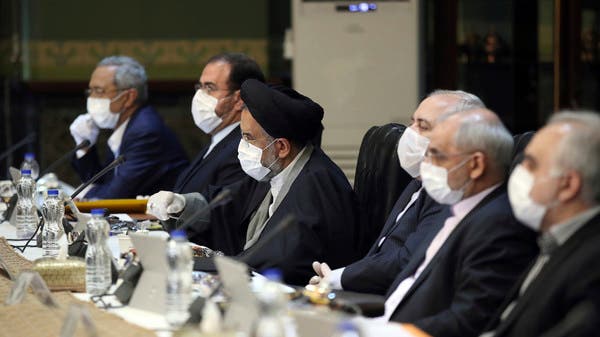Iran’s coronavirus strategy: Neglect its people, revive its proxies
Dr.Walid Phares/Al Arabiya/May 19/2020
د.وليد فارس/العربية: استراتجية إيران بما يتعلق بالكورونا فيروس: اهمال شعبها وتقوية وتمويل أذرعتها الميليشياوية
Iran’s strategies to ride the recent wave of events, both in the region and with the United States, is on the minds of many observers of the Middle East.
Before the coronavirus outbreak, Iran was attempting to survive the critical months leading up to the US presidential elections, the outcome of which could either crush or unleash Tehran’s interim and long-term goals.
Now, Tehran is attempting to use the COVID-19 pandemic to quell issues at home and to consolidate its proxies, while the world’s attention is focused on the health crisis.
Pre-coronavirus events
Toward the end of last year, after three months of unending demonstrations inside Iran, the Islamic Revolutionary Guard Corps (IRGC)-controlled regime calculated that any longer stretch of popular uprisings would eventually lead to paralysis of the system, especially considering the biting US sanctions against them.
All calculations indicated an eventual socio-economic collapse and chaos, leading to a long, protracted revolt – so Tehran’s rulers chose to escalate against “foreign enemies” to silence the domestic one – its own people.
First to bear the ire of the Ayatollahs were Gulf leaders. From missiles fired by the Iran-backed Houthi militia from Yemen at targets in Saudi Arabia, to the sabotage of UAE ships, to a blatant missile bombardment of Aramco, the regime aimed for a long-distance ballistic war with “enemy regimes.”
The US, however, did not let this go unanswered and responded with deployment-deterrents in the Gulf region, upsetting Iran’s intentions.
Because the Trump administration became a formidable obstructive force, having pulled out from the 2015 Iranian nuclear deal and designating the IRGC as a terror entity, Tehran turned its ire – and fire – toward the US military presence in Iraq.
Tehran directed its Iraqi militias, the infamous Hashd Shaabi, and terror group Kataib Hezbollah to aggress American units.
Washington, unlike during the Obama years, responded heavily against the militias, eliminating the very top of the chain of command, military commander Qassem Soleimani, leaving the regime and its allies in the region—including Lebanese Hezbollah—in a state of shock.
From January until the coronavirus pandemic, Iranian plans have been obstructed. Unable to slam the Gulf states with frontal attacks because of US deterrence, shocked by the American responses in Iraq, and sinking into an expanding domestic revolt, the regime was in its worst shape.
It had no choice but to wait out the Trump administration’s last ten months in the hope that the President’s opposition would prevail at the ballot box. The month-long impeachment hearings against President Trump in Congress encouraged the Ayatollahs to be patient for what they projected to be Trump’s demise in the fall.
The pre-coronavirus Iran strategies were simply to maintain the status quo, avoid enflaming tensions with US forces, and rely on domestic American politics to remove the administration-obstacle by end of year.
Iran’s coronavirus blessing
Then came the coronavirus from Wuhan. Iran was the second country to witness a nationwide spread, most likely due to heavy international travel between Iran and China.
The illness saturated most Iranian cities and towns without relief since its incapacitated government had spent its cash and the Iran nuclear deal money on itself and on militias across the region, instead of equipping the country with a capable health infrastructure. Deaths rose, but demonstrations died out inside Iran.
Though many Iranian officials contracted COVID-19, the upper echelon of the regime understood the opportunity this crisis provided to evade an effective mass uprising. And across the Atlantic, the United States was badly hit by the virus with tens of thousands of deaths and a bleeding economy.
COVID-19 became a double blessing for the Khomeinists. It smashed the uprising at home and is keeping the Americans busy in their homeland.
Iran’s coronavirus strategy
Iran quickly took advantage of the world panic regarding the plague with revised strategies taking shape by mid-February. New plans capitalized on America’s inward focus toward saving its population and the Gulf States and Israel’s refocused scramble to fight the spread. Basically, Iran has been moving swiftly to regroup, reorganize, rearm, redeploy and further dominate its four “colonies.”
In Iraq, the IRGC has been consolidating the militias. In Syria, Iran is assisting President Bashar al-Assad in retaking Idlib province and encircling the Kurdish areas. In Lebanon, Hezbollah is clearly in charge of the new cabinet. And in Yemen, the Houthis are dodging UN solutions and ignoring ceasefires proposed by the Arab Coalition.
Iranian activities are picking up on several continents, including an air bridge with Maduro’s regime in Venezuela.
Tehran’s coronavirus strategies are quite somber. Unimpressed and unmoved by the death toll among its own people, the regime is investing all it can to exploit the global crisis and strengthen its strategic position—with its eyes fixed fast on November 4.
It is developing its ballistic missiles (some even under the camouflage of a no-longer-secret military space program) while also investing heavily in worldwide propaganda efforts against the US.
Last, but not least, its long lobbying arm is pushing to weaken Trump’s ability to retaliate with impact on Congressional anti-war legislations barely vetoed by the White House.
Iran is preparing for two eventualities. If Donald Trump loses in November, the Ayatollahs will enjoy victory and a return to the benefits of the Iran Deal—in a stronger position than at the end of 2019.
And if Trump wins a second term, the regime wants to be as ready as possible with a new balance of power in the region and maximum deterrence capabilities.
* Dr. Walid Phares is a Middle East expert, author and former Donald Trump foreign policy advisor. He serves as a Co-Secretary General of the Transatlantic Parliamentary Group.























